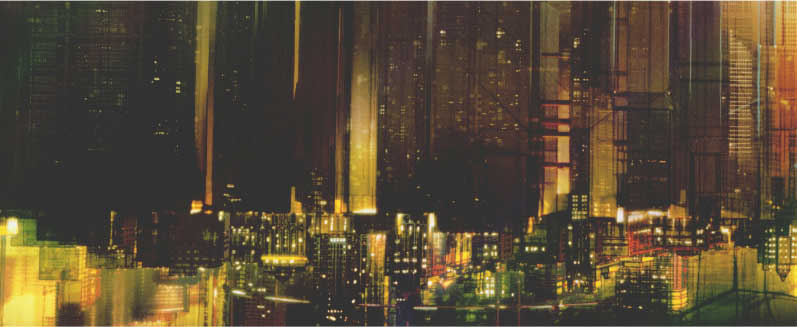
Reviewed by Anabela Voi You

The day has arrived: Wong Kar-Wai has become pretentious, and pretensions hardly ever replace artistry.
Iím a Wong Kar-Wai fan and quite a few of his films have been my consistent favorites.
And I also watched many foo-foo pretentious French films in search of the Perfect One Film of All Time, and although you may want to crucify me for saying so, I can sense the difference between pretentious attempts at artistry and artistry itself. While most Wong Kar-Wai films always had artistic mastery I think 2046 signifies the end of an era. There is a point even geniuses surpass themselves and canít create new refreshing material.
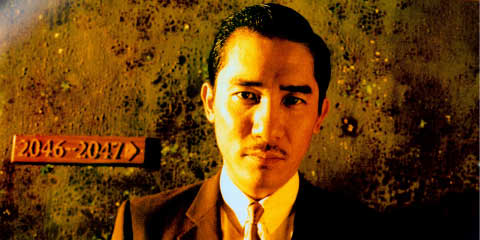
Wong Kar-Wai says that 2046 is the final chord of the Days of Being Wild and In the Mood for Love which are mere movements within a symphony. Indeed at times it does seem that a drunken conductor leads the symphony. 2046 took 5 years to complete, a talent search for new blood, incessant re-editing, and the final product is rather disappointing. The cast is the same old players of Wong Kar-waiís older films. No new blood and very little material relating to the futuristic theme of the year 2046.
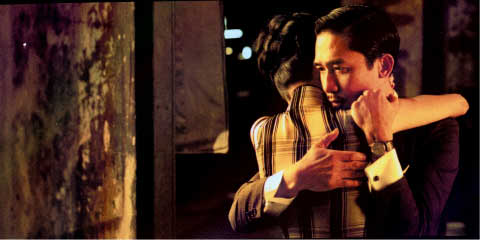
2046 takes place where In the Mood for Love left off, especially in Tony Leungís mind. Tony Leung, sporting a Casanova moustache that I canít wait to zap off, pines after In the Mood for Loveís lost soul mate Maggie Cheung. Tony deals with the pain and loss by becoming a womanizer and re-living his memories with Maggie vicariously through other women. While In the Mood for Loveís cinematography was a seamlessly elegant canvas of bygone imagery of 1960s Hong Kong, 2046ís disjointed, distracting, and disembodied camerawork is a tunnel to Tony Leungís diseased mind and imagination. The world of 2046 is completely entrenched in Tonyís now twisted mind, as he is unable to fully experience the present and imprisoned in his own imagination. Tony can only truly live in his idealized past and his novelís imaginary future of 2046. His only means to living his world is by experiencing the present through evocation of the ghosts of the past. Tony has become a full-fledged novelist whose life now is utterly consumed by his obsession of collecting present experiences and adventures that are used as literary catalysts and evocative tools to re-create the past and material for his novel. He records his daily encounters with people and happenings and transforms them into characters and their experiences during the futuristic year of 2046. There is no present for Tony. Where there was beauty In the Mood for Love there are now only decrepit memories and ugly present experiences that dangerously force a longing novelist to stubbornly cling to the past.
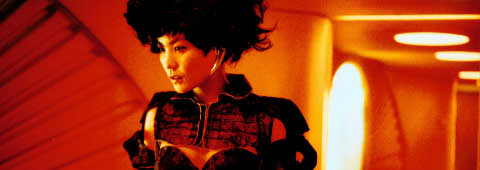
I was disappointed for Gong Li who is re-entering the film world. All these characters have become so numb to life that when Tony kissed Gong Li neither felt much. Tony sucked so hard that it was reminiscent of the Swordman IIís ďabsorbing stance.Ē Gong Liís lipstick was smeared so badly this woman looked like a deformed Chinese bread.
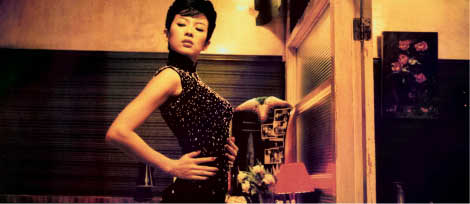
All the actors had very little room for showcasing their abilities. Zhang Ziyi was in an uncharacteristic role as a seductive ballroom dancer. I hardly recognized her and she was transformed into a playgirl with an arsenal of techniques for seduction. She had the most screen time and her presence was quite magical. Faye Wong was underused, as was Carina Lau. I feel sorry for these women and there was very little room for these actresses to improvise well; their potential for great performances is as limited as Tony Leungís characterís mind and perception of these women. Initially 2046 had rumours flying that it was going to be an international cast. The only international guy was the Japanese guy, Fayeís forbidden boyfriend who was used to play out the Chinese vs. Japanese old-war hatred drama.
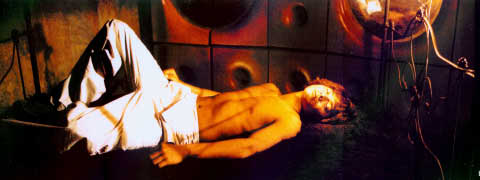
2046 was disappointing because it was supposed to be an ambitious production with a large scale feel to it. I have been looking forward to it for years. It turned out to be a badly edited film with sci-fi B flick visuals and a storyline as loose as an Ed Wood production. The argument that 2046 is merely a tunnel to Tony Leungís disturbed mind and therefore a brilliant tactic in film-making Ė it just doesnít hold water. There is a line between self-indulgent film-making and calling it art, and the boundary to greater film-making is unfortunately deceptively out of reach for 2046.
Rating: 6.0
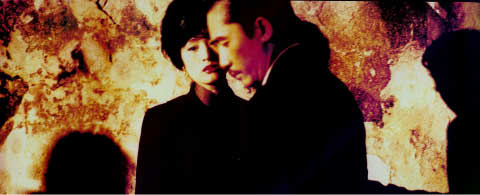
Monumental amounts of superlative-driven rhetoric and print have been bestowed on this recent avant garde release, a product more than three years in the making and shrouded in much mystery to boot. Wong Kar Wai's penchant for delivering indie goodness to the continuously uninitiated (and with his movies even aficionados often find themselves groping in the dark) has concocted a veritable legion of filmographic brevity, but with 2046 many of his breathless admirers will discover a more sedate manner of expression, as well as an increased sense of cohesion and sensibility. Overall, it has been a worthwhile wait, especially for those keen on getting whatever the frequently obscure moviemaker wants to impart.
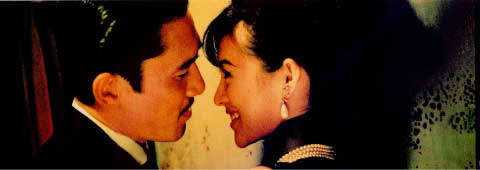
2046's name comes from several sources, all originating with its main protagonist, one Zhou Mu Yun. This fellow, done by dapper Tony Leung (Liang Chao Wei), has been a Wong Kar Wai staple since In the Mood For Love, and now returns to the screen, reprising his previous appearance as a speakeasy socialite skirting the journalist's haphazard life in 1960's Hong Kong. Zhou sits down to write a sci-fi piece inspired by his own experiences with various women of differing dispositions. As a consequence, we delve into a tale known simply as 2046, either due to the year when it takes place (Hong Kong's last as a polity separate from mainland China, according to the British-Chinese agreement), or the hotel room where some of Zhou's objects d'art reside.
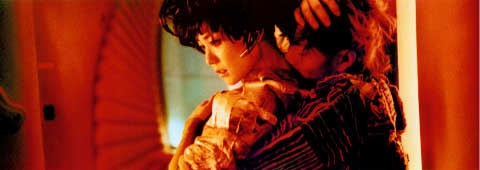
Irrespective of your own take on the film, 2046 has much to offer and seldom complicates matters as do many of Wong's older entries, a la Chongqing Express, Fallen Angles and Ashes of Time. The project does away with blurry action sequences, erratic time flow and vague narrative. Instead, it deploys an intelligible unfolding of events and masterful appearances from several cast members, albeit in a somewhat quirky fashion unavoidable in a fabrication of this nature.
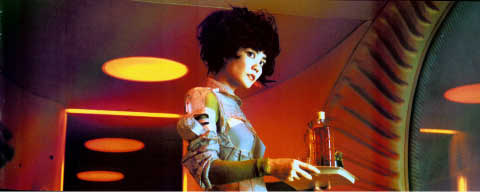
As you may recall, we had plenty of reports extolling 2046's virtues as a tribute to legendary cyberpunk icon Blade Runner, and while the two items in question have much to put them apart, definitely one can spot quite the homage in the newer release. For starters, it opens with a CGI-rendered glimpse of futuristic Hong Kong, brimming with skyscrapers and glitzy neon signs. But beyond this, 2046 discusses the subjectivity of memory, and how it generates our very lives. Throughout the movie, viewers find themselves wondering whether indeed it's Mr. Zhou sitting down to compose a work of fiction, or perhaps his 21st century alter ego (played by a slightly annoying Takuya Kimura) holds the reigns, struggling with recollection's manipulative potential. Furthermore, 2046 adds synthetic humanoids serving those in search of enlightenment or oblivion in the near future, thus referencing Blade Runner's infamous Nexus 6 replicants and their love-hate relationship with uncaring human masters.
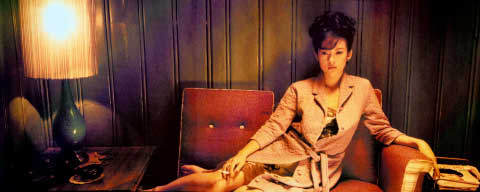
Storywise, Wong kept 2046 open to interpretation with regards to content. What can't be argued with comes in the shape of great input from two of the celebs on hand, namely Zhang Ziyi and Faye Wong. The former steals the limelight and holds it like a maddened monopoly through her depiction of sultry Bai Ling, a desperately lonely party girl who falls for Zhou Mu Yun's affable charm but ultimately realizes how marginal a position she holds in his ecstatic, lust-filled world. The latter, at long last shedding much needed light on Faye Wong's acting range, returns to the good girl next door element she did in Chongqing Express, plus adds a touch of sophistication via her double duty as an android host on a train heading for 2046's titular, but all the same unknown, destination.
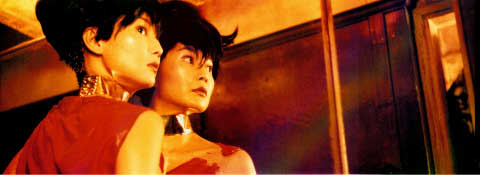
Other female cameos include solid additives from Gong Li, Dong Jie and always-competent Carina Lau (Liu Jia Ling). Each figures into Zhou's tapestry of misadventure and nighttime hijinx, fueling the man's imagination and scribing events in his fervently philosophical pseudo-future. Unfortunately, an irritating problem with 2046 must be its top billing of people who only put in miniscule screen time, like Zhang Zhen (Crouching Tiger, Hidden Dragon), and Maggie Cheung herself, flickering before our astonished eyes for mere seconds before disappearing. Those following the above mentioned religiously have a major disappointment coming their way.
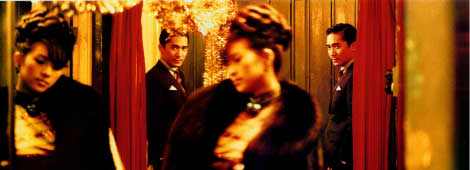
Not so for the rest of us, who can kick back and commence earnest analysis of the film's possible layers of meaning and intent. As added bonuses, genuinely funny moments thanks to Zhang Ziyi's superb capacity for tongue-in-cheek excellence, and generally impressive production values contribute to a combination likely to pique your interest and sustain it. This belongs among Wong Kar Wai's best yet, exhibiting maturity, intellectual intrigue and earthy sentimentalism, or in other words, something for everyone possessing mind and soul.
Rating: 8/10
Directed by Wong Kar Wai
Starring Tony Leung, Zhang Ziyi, Faye Wong,
Carina Lau, Takuya Kimura, Gong Li, Maggie Cheung, Zhang Zhen
2004, Putonghua, 129 minutes
